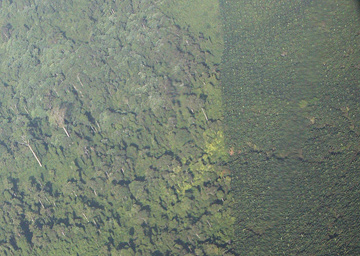Unilever calls for ban on rainforest destruction for palm oil
Unilever calls for ban on rainforest destruction for palm oil
mongabay.com
May 1, 2008
Unilever, the world’s largest consumer good company, will start using palm oil from certified sustainable sources this year and aims to have all its palm oil certified by 2015, according to a speech delivered today by CEO Patrick Cescau.
Cescau also voiced support for a moratorium on rainforest destruction for oil palm plantations in Indonesia.
“Now we need to take the next step. Suppliers need to move to meet the criteria, by getting certified both the palm oil from their own plantations and the palm oil they buy from elsewhere,” Unilever Chief Executive Patrick Cescau said in a statement. “We also intend to support the call for an immediate moratorium on any further deforestation in Indonesia for palm oil.”
“We are committed to doing this because we believe it is the right thing to do for the people who use our products, for the environment and communities in and around which palm oil is grown and for our business and our brands,” he continued.

Forest and oil palm plantations in Borneo. Photo by Rhett A. Butler |
Unilever’s announcement comes shortly after a report from Greenpeace showed that the company’s suppliers were destroying orangutan habitat and carbon-rich peatlands in Indonesia for oil palm plantations. In the report, Greenpeace revealed that Unilever could not trace the origin of its palm oil and said the Roundtable on Sustainable Palm Oil (RSPO) — the industry’s response to criticism on its environmental performance — was falling short of its stated goals of reducing the conversion of rainforest lands.
In addition to the call for a ban on forest clearing for oil palm, Unilever’s Cescau said that the company will aim to have all the palm oil it uses in Europe fully traceable by 2012.
Still Greenpeace says that Unilever’s efforts will have little impact unless other buyers join in and force suppliers abandon forest destruction.
“Unilever’s commitment to sourcing sustainable palm oil will be meaningless unless its suppliers stop trashing Indonesia’s rainforests – this is why the moratorium is so important,” Greenpeace International forest campaigner Tim Birch said. “Every day Unilever keeps buying palm oil from these suppliers, orangutans are being pushed closer to extinction and climate change continues unabated.”
Unilever is the world’s largest consumer of palm oil in the world, using 4% of total global production in its food and cosmetic products.
Environmentalists say the production of palm oil on forest lands results in the destruction of critical orangutan habitat and releases large amounts of greenhouse gases.
Indonesia presently ranks third in carbon emissions due to deforestation and degradation of peat swamps, according to Wetlands International.














